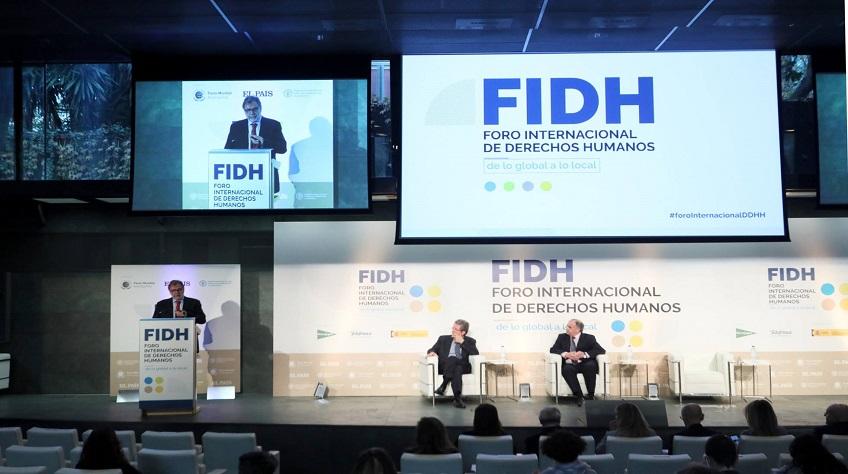News
EL PAÍS, the FAO and the Spanish UN Global Compact Network join forces for the International Human Rights Forum
13-12-2017

On December 10, 69 years ago, the Universal Declaration of Human Rights was approved. "Today, even in developed countries, many human rights are still in the category of "we’ll get round to it", said Juan Luis Cebrián, executive chair of El País, on Monday. And while traditionally, states have been asked to guarantee such rights, there are other players. The role of the private sector has been addressed at the International Human Rights Forum, organized by EL PAÍS, the the Food and Agriculture Organization and the Spanish UN Global Compact Network.
Some large corporations have budgets that are greater even than those of many countries yet they are not legally required to ensure compliance with the Declaration. "Today, companies can decide voluntarily whether they comply on human rights or not. And that is unacceptable," said Esteban Beltran, director of Amnesty International in Spain. Beltran called for specific obligations for multinationals to be established, that would ensure that they cannot ignore human rights when operating in countries with less stringent laws.
“Companies must be proactive, and not merely comply with the law if problems arise," said Fernando Ruiz, head of sustainability at energy company Repsol. Meanwhile, Angel Pes, chairman of the Spanish UN Global Compact Network, said that corporate policies in this regard should not merely be confined to company boards. Nor should the focus only be on large multinationals. We mustn’t forget small and medium enterprises, argued Bernardo Cruza, director of social responsibility at El Corte Inglés.
Attendees at the Forum, sponsored by Telefónica and El Corte Ingles, agreed that private companies can, and should, contribute to respect for the communities in which they operate, can ensure gender equality and can combat exploitation. But most importantly, according to Pes, is that they create decent jobs and employment opportunities.
Companies also have an important role to play in the emergence of new rights and in addressing new challenges such as identity and the right to digital oblivion, or data protection. Telefonica, for example, has proposed a digital Constitution that addresses these and other issues. Meanwhile, the uncontrolled use of social networks, according to Cebrián, has lead to the erosion of laws that protect against defamation, slander and falsehood in today's democracies. "And with them, the right to the presumption of innocence," said Cebrian.
And there are other issues that are not reflected in the 70-year-old Declaration, issues that are becoming increasingly important. For example, the right to a healthy environment or public space. "It is in these spaces where human rights are realized," noted Antoni Gutierrez-Rubi, writer and specialist in urban planning. And especially in urban areas, where most of humanity now lives. "If we lose this battle in our cities, we lose it in the world," warned Gutiérrez-Rubí. Cities can leverage their flexibility to get where the state machinery can’t go, agreed Paz Valiente, from Madrid’s Townhall. "But we have very limited powers and limited capacity for action," said Valiente. These are just some of the new players that can tackle a list of unfinished duties, a list that is becoming ever longer and more complicated by the day.
THE THREAT OF CLIMATE CHANGE
One of the panels discussed the effects of climate change on the realization of human rights. Because we have to remember that those most affected by climate change, as noted by photojournalist Pablo Tosco of Intermón Oxfam, and other participants, are also the most vulnerable to hunger and poverty.
80% of the world's poor live in rural areas and depend on agriculture for their livelihood, explained Marcela Villarreal, of the FAO. And obviously, climate change affects the production of food, preventing these people from enjoying these universal rights.
The relationship between climate change and hunger (or access to drinking water and other basic rights) is very close, said Lola Huete Machado, editor of Planeta Futuro and moderator of the panel discussion.
In this regard Ana Benavente, manager of sustainability at Acciona, lamented that, after the Paris Agreement of 2015, the following two climate summits have not risen to the occasion. "The States have set unambitious goals."
Source: EL PAÍS
It may interest you



